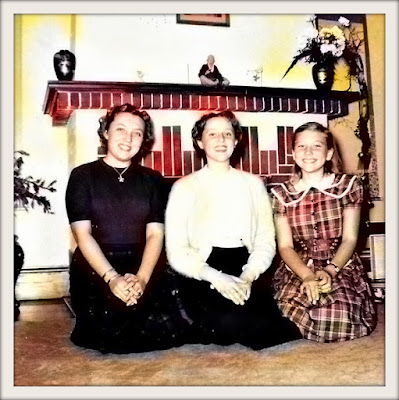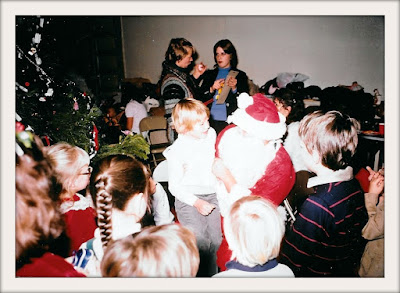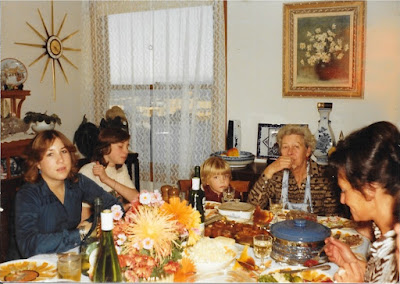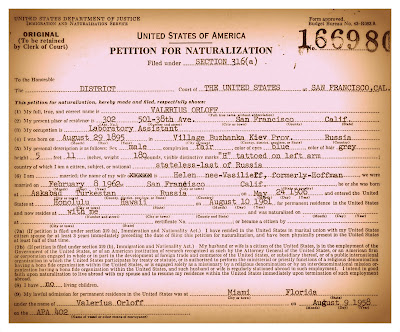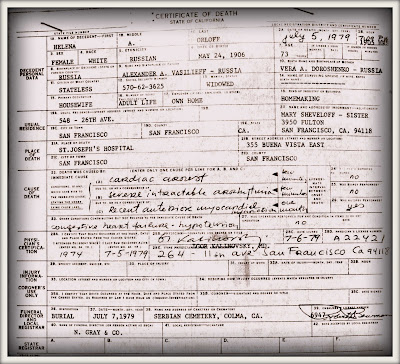Shocked by her father's objection, Yelena argued that it was a non-issue because her grandmother was Catholic. Now allegedly, Yelena's mother, the stately Vera Vasilyev née Doroshenko, was Petro Doroshenko's sixth or seventh great-granddaughter through her father, a Crimean Cossack. Her mother, however, was a Polish Catholic named Franziszka. I guess Aleksander's mother-in-law didn't carry too much weight in the house, because when it came to his adolescent offspring worshipping the Pope, he flatly refused.
Although Yelena was brutally forced to remain
Orthodox, she eventually joined some Russian Scouts—and ran with an interesting crowd. Her best friends were two guys named
Boris Andrianovich Dmitruk and
Vasya Lvov. Boris went on to become the Chief of the Manchurian Department of the
National Organization for Russian Scouts (
NORS) before succumbing to
Typhus in
Shanghai. Little
Vasya—or rather Vasily Vladimirovich Lvov—grew up to be better known as the late
Archbishop Nathanael. So much for Yelena becoming a Catholic.
 |
Valentin Valkov
Circa 1936 |
At age 22, Yelena quit the Scouts, and married a down-on-his-luck, partially disabled former military cadet named
Valentin Valkov. You can read a rather brilliant Russian article detailing his life story
here. A month after the wedding, Yelena bumped into an old Scout buddy on the street, and he offered her a gig as Commanding Officer. When she told Volkov, he was livid—and her elation was short-lived as, once again, some patriarchal traditionalist pissed on her parade. Her new husband issued an ultimatum:
"It's either me, or the Scouts! Choose!" Yelena was heartbroken; she cried, she pleaded, she threw things. But Valkov was steadfast in his idea that a woman's place should be in a lackluster, under-decorated kitchen, sweating over hot
piroskhi. This was the first of many fights, and the newlyweds separated three and half years later because, purportedly,
"he drank and didn't want to work." Interestingly, they stayed legally married until the end of the 1930's. Yelena supported Valkov financially, and when his myriad ailments necessitated a move South, she introduced him to family friends (and
Yul Brynner's cousins)
Valery and
Arseny Yankovsky, who owned and operated luxury game reserves in
North Korea. As it turned out, killing big cats was just what the doctor ordered, and the disillusioned Valkov finally found a place to call home with his new best friends, the Yankovskys—where, hopefully, the women weren't crazy broads who pursued their own interests.
 |
The Yankovskys
Circa 1930's
North Korea |
Not content to merely serve as a procurer of friends for her ex-husband, Yelena threw herself back into scouting. She also began inundating Harbin's main Russian newspaper,
Rupor (Рупор), with unsolicited poems, stories, and illustrations—all ostensibly created by a rabbit named
Yurka (Юрка). The editors liked what they saw, so they test-ran her work a few times on the children's page. Before long, the kids of Harbin were hooked, and the newspaper brought her on full-time.
 |
Yelena Vasilyeva (short and center) flanked by family and friends
Circa 1937
Harbin, China
(photo courtesy of Jorge Poulsen) |
In 1932, the
Japanese invaded Manchuria, and the first thing they wanted to know was,
"Who the hell are all these Russians, why are they here, and are they communists?" So the
Bureau of Russian Emigrants in the Manchurian Empire (
BREM, or
БРЭМ) was born; an administrative division dedicated to
"strengthening the material and legal situation of Russian emigrants residing in Manchukuo, establishing ties with the government of Manchukuo on all matters relating to emigrants, and assisting the Japanese administration in dealing with emigrant issues." Every Russian resident of Harbin was required to complete a lengthy, unwieldy census laid out like some unholy amalgamation of passport application, resume, and personality test. They're all still on file at the
The State Archive of the Khabarovsk Territory.
Yelena completed her questionnaire in
1936. She lists her profession as
journalist, and her dependent as her infirm, 83 year-old Polish Catholic grandmother,
Franziszka Josifovna Doroshenko. As for political affiliations, she claims that she's a
Monarchist with
Crimean citizenship, and that she's
"never had a Soviet passport, has never applied for one, and does not ever want one." She even organized a literary circle named after
Alexander Suvorov, the
Suvorov Literature and Arts Society of Russian Youth. For an alias, she lists
Yurka.
Yurka the Rabbit ultimately got so popular that they spun him off into his own children's magazine,
Lastochka (Ласточка) aka
The Swallow. Although it didn't start out as Yurka's magazine, per se. The magazine had been around for decades, but was on the verge of folding when one of Rupor's editors,
E.S. Kaufmann (Кауфман Евгений Самойлович), bought the rag for nothing and gave Yelena a salaried, in-house position.
The word on the street was, the current staff at Lastochka just couldn't connect with children. The serials were boring, the stories were stilted. Yelena initially produced work according to the terms laid out in her job description, but ever the rebel, she soon found her own style, and began to ignore the advice of senior writers. This led to clashes with the editors, but by all accounts, Yelena's contributions were something
Lastochka hadn't been in a long time: fresh, witty, and real. Everyone loved Yurka, and the magazine experienced a resurgence in popularity. By 1942, she'd muscled her way up to managing editor, fired everyone but herself, and spent the next three years supplying all the content (stories, poems, illustrations). After a while, she didn't even bother submitting copy for Kaufmann's review—she'd just toss the printed magazine on
Uncle Zhenya's desk and walk away.
3
In
1939, she finally got around to divorcing Valentin Valkov—if only to subsequently marry someone with the last name
Goffman. She even took on the
Goffman (Гоффман) name professionally for a few years. Mr. Goffman was most likely a man named
Alexander Leonidovich Goffman (Гоффман Александр Леонидович) whose father had been involved in the
White Movement. Very little is known about this period of her life, but one thing's for sure: at some point he must've told her what to do, because she was divorced in 1961 when she arrived in the United States—bearing the Americanized name
Helen Hoffman.
Yelena entered the United States at
Honolulu,
Hawaii on
August 10, 1961 and settled in San Francisco. Unlike her brother and sister—whose Bay Area families had immigrated years before via Japan, or the
Russian Settlement in the Philippines—Yurka was reportedly in Harbin until the bitter end. She'd even spent time training
Soviet scouts. So much for being a Monarchist.
Six months after arriving, she got married (for the third and final time) to a Ukrainian lab assistant named
Valerius N. Orloff (b. 29 Aug 1895 - d. 6 Dec 1972). The only thing I know about Valerius is that Yelena outlived him. He was basically her
Catherine Parr.
Our family knew her as
Aunt Helen, a lovable old eccentric who wrote letters to
Smokey the Bear, painted rabbits on pillowcases, and answered the phone, "
Meow?" But she also stayed active in her Golden Years by self-publishing a children's magazine called "Scout" (Скаутёнок) that she cranked out entirely by herself, month after month, on a
Xerox CEM machine. She also made a triumphant return to the world of Russian Scouting, and became something of a Bay Area luminary in that field.
Continuing to work well into the late 1970's, even after the doctor banned all activity due to heart disease, she said at the time,
"I lived in the world to bring joy to Russian children. And for me it was also a great joy!" Supposedly, she was even overjoyed that her Americanized niece chose to give birth out-of-wedlock because "it was a clever way to make sure the
Vasilyev name didn't die out."
Unfortunately,
Yurka died in San Francisco on
July 7, 1979 (or fortunately, given the quality of life experienced by 112 year-old women these days). One of my earliest memories is attending her funeral. It was open-casket, and Yelena was dressed in a Scout uniform. Even as a three year-old child, I remember thinking she struck me as too youthful to have died from "old age."

